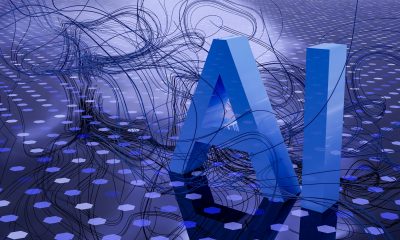Business
How the internet of things shapes SEO’s present and future
The internet of things will revolutionize how the SEO industry operates and works.

The internet of things (IoT) is one of the most prominent and dynamic technological developments of today. In fact, its ascent marks a seismic shift, a dawn of the new major tech revolution.
By 2020, there will be 24 billion connected devices on the globe and they will continue to drive IoT investing and adoption. This is where the crest of the digital wave of innovation is, and the ripples can be felt across the digital universe, including the realms of internet marketing and SEO. So, will they fall from grace or rise above and reach new heights?
Winds of change
Let us say at this point that the internet of things is a true game changer. The surge in the smart home technology field is more than another fad that captures the imagination of the consumers. The smart paragons fulfill a variety of roles and they also tend to possess a search function. Thus, the matrix of interconnected devices gives rise to big changes that affect businesses, users, search engines, and marketers.
For now, the fundamental rules remain intact. Best practices still work and standard SEO checklists served as a guiding light in 2017. Yet, nowadays, people have the resources and tools to access information, consume content, and purchase products in new ways. Desktops have been overthrown by mobile devices as the top source of internet traffic, but something new is coming. Residential marketing is on its way to becoming a great new playground.
Is it a whole new ballgame?
Businesses have taken notice across industry sectors. They have started to employ new techniques of gathering data, realizing that the internet of things acts as an incredible education platform. Along the similar lines, marketers are able to uncover buying patterns and gain deep insights into consumer behavior. Consequently, they can tailor their messages and assets to the wants and needs of users and give them what they want: an emotionally satisfying experience, relevant info, and valuable content.
Furthermore, the search is expected to lean heavily towards conversational queries. Users have already begun to ask all-knowledgeable internet deities like Google long-tail questions. What’s more, as AI tech makes leaps and bounds, we are also witnessing the rise of digital assistants.
Many people have taken advantage of their ability to interpret and respond to vocally-input queries. The keyword-based search is no longer the mainstay, but what does this mean for the world of SEO?
Alternative optimization
Well, first off, click-through rates may be on route to decline. Users will be enticed to bypass websites and search engines. After all, they can utilize their smart devices to handle nearly all aspects of the daily life. According to Domains Index, domain names are also susceptible to the influence of seasonal trends and reflect broader changes. It might not all bad for webmasters, though. Rather than perish, they will simply optimize their pages and render them visible to IoT search.
As a result, a drastic reconfiguration of SERPs will ensue. Browsing through websites as we know it today is going to take a backseat or as some proclaim, completely disappear. Likewise, the optimization will focus less on search engines. This could lead to something that seems implausible from today’s standpoint: Users disregarding Google as the main tool to achieve their goals. Finally, with the establishment of integrated data systems, personalization of user experience will gain even more traction.

The internet of things promises to bring convenience and everyday living to a whole new level. (Source)
Endless horizon
Of course, Google and other search engines will not go without a fight. They will align their practices and strategies will new trends and realities. Let us not forget that Google even bought the home control company Nest back in 2014. It is hard to predict where this will lead us, but one thing is for certain: It will be the brave new world of digital marketing. Ultimately, IoT could be a powerful personalization and engagement too, one that takes optimization to the next level.
It is safe to assume that marketers will at least be under pressure to factor in smart devices when figuring out their strategies and campaigns. But, let us not get ahead of ourselves because the collapse of the digital order has not started yet. Sophisticated networks and smart systems are not exactly a commonplace in homes. Nevertheless, in due time, IoT may propel digital marketing beyond our wildest imagination. There is immense potential waiting to be tapped into.
The future is now
IoT will play a pivotal role in the evolution of search results and SEO. Its profound impact is already visible in the form of trends such as colloquial commands. SEO professionals and marketers have no other option than to adapt. They must aspire to provide a fully integrated online experience because flexibility is the name of the game.
And if you are wondering when the full-fledged revolution will take place, that will depend on the rate of IoT tech adoption, which, despite the buzz, is still relatively low. Then again, tech marvels like the internet of things can always grow in unpredictable ways and unexpected places.
—
DISCLAIMER: This article expresses my own ideas and opinions. Any information I have shared are from sources that I believe to be reliable and accurate. I did not receive any financial compensation in writing this post, nor do I own any shares in any company I’ve mentioned. I encourage any reader to do their own diligent research first before making any investment decisions.

-

 Africa1 week ago
Africa1 week agoBLS Secures 500 Million Dirhams to Drive Morocco’s Next-Gen Logistics Expansion
-

 Fintech2 weeks ago
Fintech2 weeks agoRipple Targets Banking License to Boost RLUSD Stablecoin Amid U.S. Regulatory Shift
-

 Impact Investing3 days ago
Impact Investing3 days agoSustainable Investments Surge in Q2 2025 Amid Green and Tech Rebound
-

 Biotech1 week ago
Biotech1 week agoBiotech Booster: €196.4M Fund to Accelerate Dutch Innovation




















You must be logged in to post a comment Login